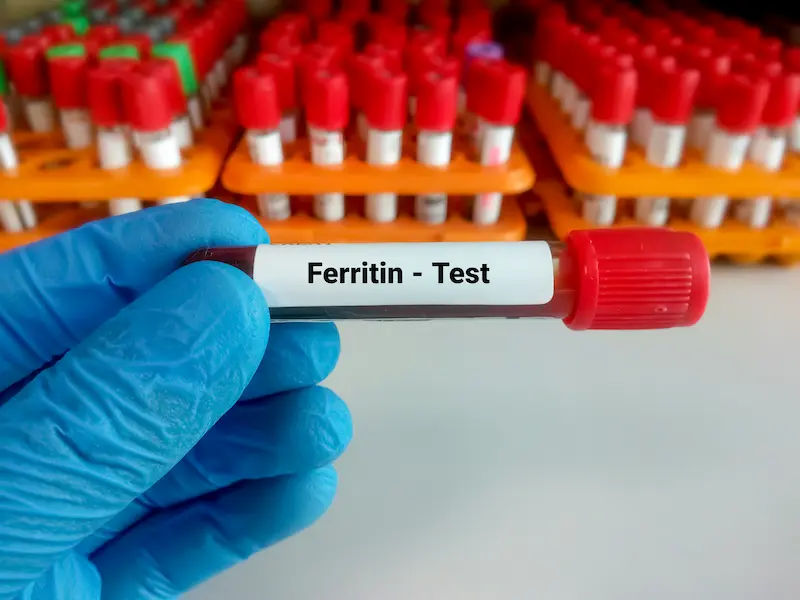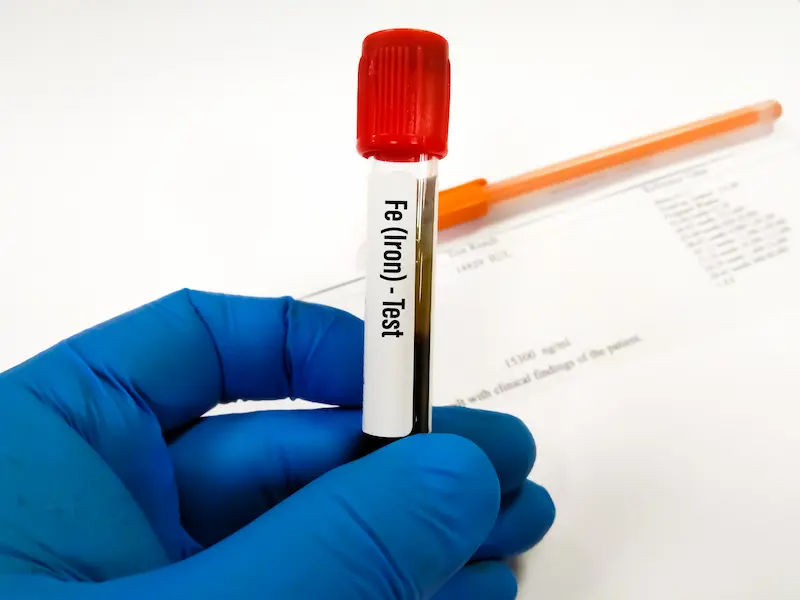Understanding Iron Studies: Fatigue, Hair Loss, and More
Iron deficiency is common in women and can cause fatigue, hair loss, and more. Learn how iron studies help detect low iron levels and guide personalised treatment.

Written by Dr. Rohinipriyanka Pondugula
Reviewed by Dr. Shaik Abdul Kalam MD (Physician)
Last updated on 10th Sep, 2025

Iron is an essential mineral that helps the body produce energy, support immune function, and maintain healthy blood, skin, and hair. For women, keeping iron levels within a healthy range is especially important. Menstruation, pregnancy, breastfeeding, and certain dietary choices can all increase the risk of low iron levels.
Iron deficiency in women is one of the most common nutritional problems, often causing symptoms such as tiredness, hair loss, pale skin, and difficulty concentrating. These signs can be easy to overlook or mistake for stress, ageing, or poor sleep. To understand whether these symptoms are linked to low iron, doctors may recommend iron studies for women. This article explains what iron studies are, why they matter for women, how iron deficiency affects your health, and how testing can help you make better decisions for your wellbeing.
Why Is Iron So Important for Women?
Iron is crucial for producing haemoglobin, the protein in red blood cells that carries oxygen from your lungs to all parts of your body. Without enough iron, your body cannot make enough healthy red blood cells, leading to a condition called iron deficiency anaemia. Anaemia means your organs and muscles get less oxygen than they need to work well.
Women are at higher risk of iron deficiency for several reasons:
- Menstrual Blood Loss: Regular monthly bleeding causes loss of iron. Women with heavy periods lose even more.
- Pregnancy and Breastfeeding: These stages increase the body's iron requirements to support the baby and milk production.
- Dietary Habits: Vegetarians, vegans, or those eating insufficient iron-rich foods may not get enough iron.
- Health Conditions: Problems like heavy bleeding, digestive disorders (e.g. celiac disease), or surgery can reduce iron absorption.
Because iron deficiency develops gradually, symptoms can be mild and easy to ignore. That’s why iron studies are essential; they help detect deficiency before it becomes severe.
What Are Iron Studies and What Do They Measure?
Iron studies are a set of blood tests that help your doctor assess your body’s iron status. Rather than just measuring iron alone, these tests look at several markers to give a complete picture:
- Serum Iron: The level of circulating iron in your blood.
- Total Iron-Binding Capacity (TIBC): Indicates how well your blood can carry iron.
- Transferrin Saturation: The percentage of transferrin (an iron transport protein) that is actually carrying iron.
- Serum Ferritin: Shows how much iron your body has stored.
Together, these tests help differentiate between iron deficiency, anaemia, or other conditions such as chronic disease or iron overload.
Schedule an Assessment and Get Your Health Checked
Common Symptoms of Iron Deficiency in Women
Iron deficiency often causes symptoms that can feel vague but affect your daily life. Women especially report:
- Fatigue and Low Energy: The most common symptom; low iron means less oxygen to muscles, so you tire easily.
- Hair Loss and Thinning: Hair follicles need iron to stay healthy. Deficiency can lead to hair shedding.
- Pale Skin: Reduced red blood cells make your skin look pale or dull.
- Shortness of Breath: When your blood can’t carry enough oxygen, simple activities may leave you breathless.
- Dizziness or Light-headedness: Low oxygen supply to the brain can cause these sensations.
- Cold Hands and Feet: Poor circulation from anaemia may make extremities feel cold.
Restless Legs Syndrome: Some women with iron deficiency experience uncomfortable sensations in their legs.
Because these symptoms overlap with other health issues, iron studies help confirm if low iron is the cause.
Who Should Consider Iron Studies?
Although iron deficiency can affect women at any stage of life, some are more at risk than others. If you fall into any of the following categories, it’s especially important to check your iron levels:
- Women with heavy or prolonged periods
- Pregnant or breastfeeding women
- Vegetarian or vegan diet followers, who may be low in easily absorbed iron
- Women with ongoing fatigue, unexplained weakness or hair loss
- Those with digestive issues or a history of surgeries that affect nutrient absorption
- Women with chronic illnesses or inflammatory health conditions
What Happens During an Iron Study Test?
Iron studies require a simple blood test, usually from a vein in your arm. The procedure is quick, with minimal discomfort. Your doctor may advise fasting for several hours before the test to ensure accurate results.
Once the blood is collected, the samples are sent to the lab where they measure the levels of serum iron, ferritin, TIBC and transferrin saturation. Your doctor will explain the results to you.
How Do Iron Study Results Affect Your Treatment?
Knowing your iron status helps your doctor recommend the right treatment. Here are common scenarios based on results:
- Iron Deficiency Without Anaemia: You may be advised to increase dietary iron and take supplements to replenish stores.
- Iron Deficiency Anaemia: Treatment usually includes iron supplements and investigations into the cause (e.g. heavy periods, bleeding).
- Normal Iron Levels: If symptoms persist, your doctor will explore other causes.
- Iron Overload: Rare, but sometimes indicated; requires specialist management.
Treatment plans depend on your individual needs, but the key is early detection through iron studies.
How Can Women Prevent Iron Deficiency?
Along with testing, prevention is important. Here are the tips for women to maintain healthy iron levels:
- Eat iron-rich foods like lean meats, spinach, lentils, beans and fortified cereals.
- Combine plant-based iron sources with vitamin C-rich foods (like oranges or tomatoes) to enhance absorption.
- Avoid excessive tea or coffee during meals, as they can reduce iron absorption.
- Manage heavy periods by consulting your doctor.
- Discuss iron supplements during pregnancy with your doctor.
Popular Iron Studies and Women’s Health Packages at Apollo 24|7
Apollo 24|7 offers reliable and easy-to-book health tests that are especially helpful for women dealing with symptoms like tiredness, hair loss, or low energy. You do not need to visit a clinic because samples are collected right at your home, and reports are delivered quickly online.
Here are some popular options:
- Iron Studies (Iron + TIBC): This test checks your serum iron, total iron-binding capacity (TIBC), unsaturated iron-binding capacity (UIBC), and transferrin saturation. It gives a complete picture of how much iron is in your blood and how well it’s being used.
- Apollo Women Wellness Package: A comprehensive health check-up for women that includes iron markers, vitamin D, vitamin B12, thyroid function, and more. It’s useful for identifying multiple causes of fatigue, hair loss, and low energy.
Book an Apollo Women Wellness Package
- Hairfall Check Advance - Female: Designed for women experiencing hair loss, this package includes tests for ferritin, iron levels, thyroid function, and essential vitamins. It helps find out if hair loss is related to iron deficiency or other health issues.
Book an Apollo Hairfall Check Advance - Female
Conclusion
Iron studies for women are essential in uncovering the causes behind common yet often overlooked symptoms like persistent fatigue, hair thinning, and unexplained weakness. By measuring key markers in your blood, these tests empower doctors to pinpoint issues and provide care that aligns with your unique health needs.
If you've been noticing any of these signs, don't brush them aside. Iron deficiency in women is more common than you realise, and early detection can lead to quicker, more effective treatment. With Apollo 24|7, scheduling your iron study is easy, affordable, and making it simpler than ever to feel your best again.
Schedule an Assessment and Get Your Health Checked
₹950(₹2375)60% off

.webp)

.webp)
